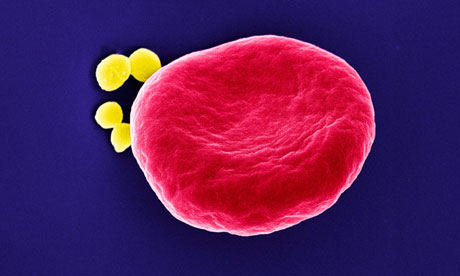Health
Related: About this forumAntibiotic resistance: why we must win the war against superbugs
http://www.guardian.co.uk/lifeandstyle/2013/mar/17/antibiotic-resistance-war-against-superbugs
Staphylococcus aureus bacteria on a red blood cell. Photograph: Getty Images/Visuals Unlimited
Last week, Dame Sally Davies, the chief medical officer of England, likened the problem of antibiotic resistance to the risks presented by international terrorism. While this might sound like an exaggeration the threat was actually, if anything, understated. Each year, the global number of deaths to which bacterial resistance contributes far outstrips those caused by terrorist attacks.
While it is difficult to track the global impact of antibiotic resistance across all bacterial species, the World Health Organisation estimates that for tuberculosis alone multi-drug resistance accounts for more than 150,000 deaths each year. Antibiotic resistance is no longer an abstract risk: this is now a war.
In the past 100 years, our expectations of life and survival have changed beyond all recognition. At the beginning of the 20thcentury, life expectancy in the UK stood at around 47 years of age for a man and 50 for a woman, a number heavily skewed by the very high rate of infant mortality in those days. Around a third of all deaths occurred in children under the age of five, largely because of infectious disease. Today, in contrast, a child born in Britain today has a better than one in four chance of reaching their 100th birthday. For this we have public health systems, vaccination and antibiotics to thank. It is by these means – the prevention and treatment of illnesses caused by microorganisms – that the real war against disease is principally won.
Elsewhere we have pushed the limits of survival; notably in intensive care. This, the specialism in which I chose to train, is where antibiotic resistant organisms are most prevalent. Here powerful antibiotics, essential in the treatment of life-threatening illness, are used routinely. These drugs decimate ordinary bacteria. But what they leave behind are hardy species which have begun to learn tricks that allow them to evade antibiotic drugs.
Thirties Child
(543 posts)Twice, once in 1944 and again in 1948, I had an infection in my foot, with red lines running up my leg. The treatment was soaking my foot in epson salts, an hour in, an hour out, an hour in, etc. for a week. My grandmother said I lucky to survive it at all. Fast forward to 1970. My son had an infection with red lines running up his leg. The doctor gave him a shot of an antibiotic, told me to give him an antibiotic every four hours during the night. The next morning, the infection was gone.
CanSocDem
(3,286 posts)...is the point. Natural treatments take longer and are more labour intensive, but ultimately are just as effective, unless 'getting back to work' is the primary objective.
Thanks to the pharmaceutical industry, the workers productivity won't be interrupted.
.
NickB79
(19,236 posts)The stunning change in child mortality rates over the past century makes that abundantly clear for anyone to see, as the OP's article points out.
NickB79
(19,236 posts)Without antibiotics, transplantation medicine is dead in the water. Between the potential risk of infection due to the procedure and subsequent recovery, and the requirement to be on anti-rejection medications for the rest of your life that weaken your natural immune response, we will no longer be able to contemplate what are today routine procedures like heart, lung, kidney or liver transplants.